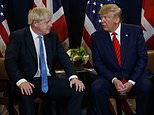Restrictions on the use of antibiotics on UK farm animals ‘watered down to help US trade deal’
Restrictions on the use of antibiotics on British farm animals ‘were watered down to help post-Brexit US trade deal’
- Campaigners accuse UK ministers of giving themselves ‘blank slate’ on safety rules so they can clinch post-Brexit deal with the US
- Rules in force from January ‘will no longer refer to hundreds of medicines currently restricted or banned in the UK for use on animals’
- They claim this flies in the face of vow not to compromise UK’s food standards
By Brendan Carlin Political Correspondent For The Mail On Sunday
Published: 19:40 EDT, 15 August 2020 | Updated: 20:07 EDT, 15 August 2020
Tough safety standards restricting the use of antibiotics on British farm animals have been quietly weakened to make a lucrative post-Brexit US trade deal easier, it was claimed last night.
Campaigners accused Ministers of giving themselves ‘a blank slate’ on safety rules so that they can compromise on the UK’s world-renowned food production standards to clinch an agreement with Washington.
They claim that rules in force from January will no longer refer to hundreds of medicines currently restricted or banned in the UK for use on animals – including one antibiotic used ‘routinely’ in US cattle.
That is said to fly in the face of repeated Government promises that it will not compromise on Britain’s food production standards by letting in controversial US products such as chlorinated chicken and hormone-fed beef.
Kierra Box, of Friends of the Earth, said: ‘Ministers keep saying that they will uphold existing UK standards, but this shows that promise just doesn’t wash.


Campaigners claim that rules in force from January will no longer refer to hundreds of medicines currently restricted or banned in the UK for use on animals – including one antibiotic used ‘routinely’ in US cattle (pictured, Boris Johnson with Donald Trump, 2019)
‘Deleting these standards gives them a blank slate to set new, weaker standards and water down our environmental protections.’
The claims were denied yesterday by the Department for Environment, Food and Rural Affairs (Defra). However, Tory grandee and former Environment Secretary Lord Deben (formerly John Gummer) said it did look as though the Government had changed the rules.
He called on Ministers to clarify this ‘extremely important issue’ by issuing a ‘categoric assurance’ that safety standards would not be sacrificed post-Brexit.
Earlier this year, The Mail on Sunday launched a Save Our Family Farms campaign to keep controversial US food products off UK shelves and to maintain our high food production standards.
However, campaigners yesterday raised the alarm over a little-noticed rule change last year which they say removed legal reference to hundreds of medicines currently restricted or banned for use on farm animals.
Britons would run out of food by this Friday if the country was solely reliant on homegrown produce, claims NFU
Britons would run out of food by this Friday if the nation was solely reliant on homegrown produce, according to new research.
Analysis by the National Farmers’ Union has found the proportion of the food that we consume that is produced in the UK has plummeted from 80 per cent in 1980 to just 64 per cent now.
It means that without imports, our supplies would run out on August 21 – or ‘self-sufficiency day’ as it has been called by the NFU.
Experts say the alarming statistics should be a wake-up call for the Government to prioritise food supply and for the public to buy more British produce.
Friends of the Earth said that included an antibiotic called monensin used in the US beef production but restricted for use in the UK under existing EU regulations.
They said the change, made in a Veterinary Medicines and Animals and Animal Products ‘statutory instrument’ agreed last year by Theresa May’s government, revoked reference to the restricted medicines list and warned it could lead to Ministers being able to classify ‘pharmacologically active substances’.
Ms Box said: ‘These are all areas where we’ve enjoyed high standards and which are at risk of being weakened during trade negotiations with the US, Australia and wherever else we need to go, cap in hand.’
However, Defra reaffirmed the Government’s commitment to maintaining food standards.
A spokesman said: ‘We are absolutely committed to maintaining the stringent controls on the medicines that can be used for all animals, including food-producing ones, following the end of the [Brexit] transition period. This means the ban on monensin as a growth promoter and other controlled substances will remain in place, helping to protect the health of people, animals and the environment.’
Officials also insisted that the current EU-based list of restricted medicines would be replaced with a new list in January, which would retain its predecessor’s key provisions.
But Lord Deben said last night: ‘The Government has repeatedly said safety regimes on food production and farm animals will not change post-Brexit, that what is now the law will remain the law.
‘However, this does seem to an alteration of the current law.
‘The policy seems to be moving from complete prohibition to future decision-making by Ministers. ‘This is an extremely important issue for people’s health.’
The Mail on Sunday revealed two months ago that Boris Johnson planned to slap prohibitively high tariffs on sub-standard US food – which would effectively keep it off the UK market.
Allies of International Trade Secretary Liz Truss have also played down fears of a post-Brexit sell-out of UK farming by pointing out how hard she was currently negotiating with Japan to get it to import more Stilton cheese.
![]()


